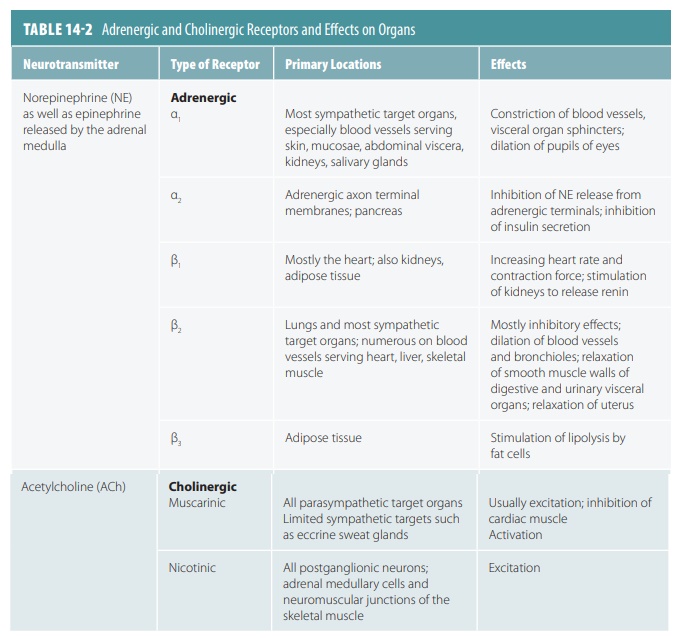Cholinergic Receptors
| Home | | Anatomy and Physiology | | Anatomy and Physiology Health Education (APHE) |Chapter: Anatomy and Physiology for Health Professionals: Autonomic Nervous System (ANS)
Sympathetic and parasympathetic preganglionic fibers secrete Ach, and are therefore called cholinergic fibers.
Cholinergic
Receptors
Sympathetic and parasympathetic
preganglionic fibers secrete Ach, and are therefore called cholinergic fibers. This is in contrast
to most sympathetic postganglionic axons, which release NE, and are called adrenergic fibers. The effects of ACh and NE upon their
effectors are not always excitatory or inhibitory, because the action of each
neurotransmitter is based on the receptor to which it binds. Each autonomic
neurotransmitter binds with two or more receptor types, which allows it to
activate or inhibit various body targets. TABLE
14-2 summarizes adrenergic and
cholinergic receptors and their effects on organs. The two types of cholinergic
receptors are nicotinic recep-tors and muscarinic receptors.

Nicotinic Receptors
Nicotinic receptors respond to nicotine, whereas muscarinic receptors respond to the toxin known as muscarine, which is derived from mushrooms. All ACh receptors fall into these two categories. Nicotinic receptors are present on all postganglionic neurons, whether they are sympathetic or parasympathetic. They are also present on the hormone-producing cells in the adrenal medulla and on the sarcolemma of skeletal muscle cells at neuromuscular junctions. ACh binding to nicotinic receptors always causes stimula-tion, directly opening ion channels and depolarizing postsynaptic cells.
Muscarinic Receptors
Muscarinic receptors are present
on all parasympa-thetic target organs and certain sympathetic targets, such as
the eccrine sweat glands. They are activated by ACh. All these effector cells
are stimulated by post-ganglionic cholinergic fibers. ACh binding to
musca-rinic receptors causes either inhibitory or stimulatory effects, based on
the type of muscarinic receptor on the target organ. When ACh binds to cardiac
muscle receptors, heart activity is slowed, and when it binds to smooth muscle
receptors in the gastrointestinal tract, motility is increased.
Related Topics
